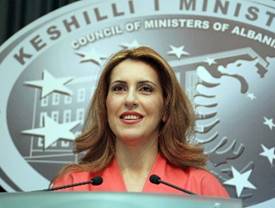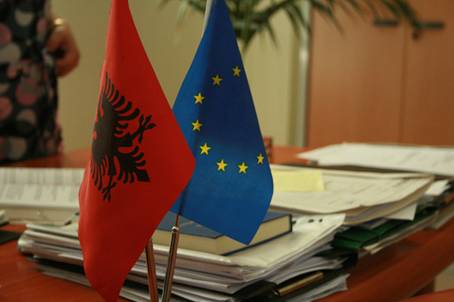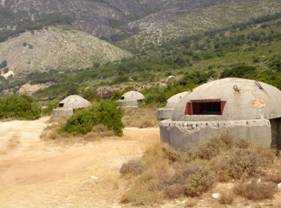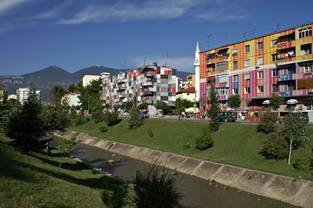Western Balkans Visa Grade Reports - Albanian Elections June 2009
Dear friends of ESI,
Our publications concerning the European debate on visa-free travel for Balkan countries have already attracted a great deal of media attention. Then a recent ESI report – EU Scorecard - Which Balkan countries deserve visa-free travel (22 May) – suddenly found itself thrust into the political fray during the current parliamentary election campaign in Albania. Elections will take place this coming Sunday.
In a televised debate on TV Klan, Majlinda Bregu, Minister of European Integration from the governing Democratic Party, accused Ditmir Bushati, a Socialist Party candidate, of passing off the ESI report as the conclusions of the European Commission. Holding the ESI report before the cameras, she accused Bushati himself of being the real source behind the conclusion that Albania was failing to meet the EU's conditions for visa-free travel. In fact, the ESI analysis was based entirely on European Commission assessments – all available on our website.
The fact of the matter is that Albania, together with Bosnia-Herzegovina, has fallen behind the rest of the Balkans in the pursuit of visa-free travel – a goal to which both parties in Sunday's election are firmly committed. However, the news is not all bad. Our analysis is that, with a sustained effort from the next government, the gap could be closed within a year.
 |
 |
|
Majlinda Bregu |
Ditmir Bushati |
Grading Progress on Meeting Visa Conditions in the Balkans
That visa free travel for Western Balkan citizens to the EU in 2010 appears within reach is also due to the efforts of the Czech EU presidency. Identifying which countries currently deserve it is the purpose behind the five ESI Visa Grade Reports posted on our website today.
These five Grade Reports are based on the most detailed comparative assessment of progress in each Balkan country ever done, drawing on all the Commission assessments and EU expert mission reports submitted in recent months. They show in detail how much the countries of the region have done against each of the 42 benchmarks. They also highlight what remains outstanding. See here for our detailed assessment of progress in Albania.
The ESI Grade Reports reveal that the European Commission is fully justified in proposing to offer visa-free travel to Macedonia, Montenegro and Serbia (conditional on further progress in the coming months in Montenegro and Serbia) by the end of 2009.
They also show that, while Albania is indeed behind the other three countries, the gap could be bridged within a year of sustained effort. In fact, no other country has been judged as harshly by the European Commission as Albania! While the European Commission found Albania to be far behind Serbia and Montenegro in each of the four major reform areas (document security; illegal migration; public security; fundamental rights), our detailed assessment of the 42 specific conditions shows that the gap – while real – is actually much narrower. At this point, examining all 42 detailed conditions, Albania is also much more advanced than Bosnia-Herzegovina.
In the coming weeks, we will post all our detailed assessments of conditions in all 5 countries of the region on our website. We will also describe how the EU visa process demonstrates the remarkable 'soft power' of the EU pre-accession process to bring about real reforms, when applied in a manner that is both strict and fair.
The coming year will show whether the EU is willing to apply these principles also to Albania.
 |
Albania's image in Europe
It was 1996. An English journalist was sitting in Tirana, watching Wimbledon on television in his hotel room with an Albanian friend.
"Confronted with two tennis players and the serried ranks of smartly dressed spectators in faraway London, I now felt that same force of shock. It was so ordered, so formal, so regulated and well behaved, so improbable. How could you ever get human beings to comport themselves in such an impeccable fashion? It didn't speak of money, but of rules voluntarily obeyed, reasonable laws formulated by intelligent, civilised people with the good of the community at heart, of trust, compromise, safety and peaceful coexistence. Everything Albania wasn't, in fact."
(Robert Carver, The Accursed Mountains)
The idea that Albania is somehow un-European – Europe's own Heart of Darkness – has only recently begun to fade. It is high time. Albania has undergone a tremendous transformation in the past decade, all the more striking given its horrific legacies and traumatic early years of transition.
Our recent documentary film, Albanian Renaissance, shot in summer 2007 described Albania's economic recovery, the transformation of Tirana and the innovative civil society organisations that are building a new tradition of creative, non-violent protest.
Since filming that documentary, the country has continued to move forward. On 1 April 2009, Albania joined NATO and on 28 April Albania submitted its official application to become a candidate for EU accession. Some of the people we portrayed in 2007 have entered politics and will stand for election this Sunday: Elisa Spiropali, then a young leader of the NGO Mjaft, is now a parliamentary candidate for Edi Rama's Socialist Party. Erion Veliaj and Arbjan Mazniku created the political movement G99 and are now running for parliament (in 2008, Erion joined us for six months as an ESI analyst, undertaking research on the economic transformation of Timisoara).
This weekend, 13 years after scenes from Wimbledon inspired Carver's dark musings on civilisation and anarchy; Albanians have a chance to show the world just how far their country has progressed. Albania's friends abroad will be hoping that this time the voting will not be marred by irregularities, and that it will produce a clear and uncontested mandate for the next government.
 |
 |
|
Albania – Then and now |
|
Despite recent progress, an uphill battle …
The challenges facing Albania after these elections are formidable. The country remains one of the poorest in Europe; the average Albanian is poorer than the average citizen of Peru or Namibia. Albania's GDP per capita in 2008 (US$4,095) is less than half of Turkey's (US$10,472), a quarter of Croatia's (US$15,628) and less than a tenth of Germany's (US$44,660). The only Europeans poorer than Albanians are Ukrainians, Armenians, Georgians, Kosovars and Moldovans (IMF 2008).
While the Albanian economy has been growing at a rate of above 5% per year from 2003 to 2008, it is now threatened by the global economic crisis. In 2007, according to UNCTAD, the total stock of FDI (i.e. the value of all assets owned by foreigners) in Albania with over 3 million people was much lower than in Montenegro, a much smaller country (650,000) with similar resources and geography. Even during Albania's period of growth, companies have struggled to become competitive: a recent competitiveness survey (2008/2009) puts Albania in 108th place behind Moldova, Pakistan, Ghana and Bosnia-Herzegovina and, according to the World Economic Forum ranking (2008/2009), the least competitive economy in Europe.
Albanian companies struggle to produce goods that can compete in external markets. Albanian exports amounted to an estimated US$1.4 billion in 2008. Tiny Estonia (1.3 million people), by comparison, exported more than US$13 billion. Albania's exports are less than a third of neighbouring Macedonia's, half of Georgia's and barely higher than Armenia's, a landlocked country with few natural resources and two closed borders (with Turkey and Azerbaijan).
As a result, Albania suffers from a serious unemployment problem. While the number of job seekers continues to grow, swelled by an additional 45,000 young people entering the labour market each year, only 6-7,000 new jobs are created each year (based on 2001-2008 data from the State Statistical Office INSAT).
In short: while Albania has travelled far from the turbulent days of the 1990s, it remains isolated and trapped in poverty. Whoever wins the elections this Sunday will face an uphill struggle to bring about the peaceful revolution of Albanian society that will be required to turn this around.
Best regards,

Gerald Knaus
- Who is behind ESI and what do we really want?
- Albania Documentary – Albanian Renaissance
- ESI Op-ed on Visa Issue in EUObserver
- ESI Visa Grade Reports
- Rumeli Observer (blog): Visa and the Czechs
- ESI Turkey Film Screening in Berlin – 30 June (in German)
- ESI's major donors: Erste Stiftung – Bosch Foundation – OSI
